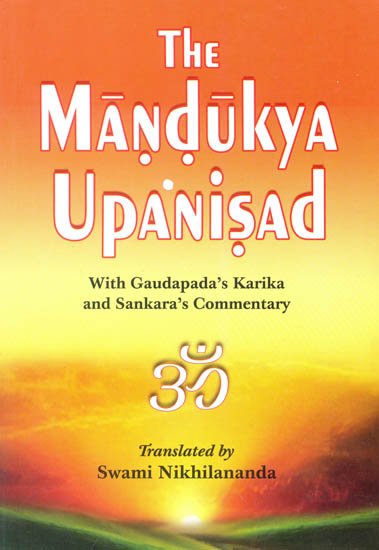Mandukya Upanishad (Gaudapa Karika and Shankara Bhashya)
by Swami Nikhilananda | 1949 | 115,575 words | ISBN-13: 9788175050228
This is verse 2.7 of the Mandukya Karika English translation, including commentaries by Gaudapada (Karika), Shankara (Bhashya) and a glossary by Anandagiri (Tika). Alternate transliteration: Māṇḍūkya-upaniṣad 2.7, Gauḍapāda Kārikā, Śaṅkara Bhāṣya, Ānandagiri Ṭīkā.
Mandukya Karika, verse 2.7
Sanskrit text, IAST transliteration and English translation
सप्रयोजनता तेषां स्वप्ने विप्रतिपद्यते ।
तस्मादाद्यन्तवत्वेन मिथ्यैव खलु ते स्मृताः ॥ ७ ॥saprayojanatā teṣāṃ svapne vipratipadyate |
tasmādādyantavatvena mithyaiva khalu te smṛtāḥ || 7 ||7. The serving a purpose (as means to an end), of them (the objects of waking experience) is contradicted (opposed) in dream. Therefore they are undoubtedly admitted to be illusory on account of their (both waking and dream) being with a beginning and an end.
Shankara Bhashya (commentary)
(Objection)—The assertion that the objects perceived to exist in the waking state are illusory like those of the dream state is illogical. It is so because the objects of the waking experience, such as food, drink or vehicles, etc., are seen to serve some purpose, that is, they appease hunger and thirst as well as do the work of carrying a man to and fro. But this is not the case with the objects perceived in dream. Therefore the conclusion that the objects perceived in the waking state are unreal like those seen in dream is mere fancy.
(Reply)—It is not so.
(Objection)—Why?
(Reply)—It is because the serving as means to some end or purpose which is found in respect of food, drink, etc. (in the waking state) is contradicted in dream. A man, in the waking state, eats and drinks and feels appeased and free from thirst. But as soon as he goes into sleep, he finds himself (in dream) afflicted with hunger and thirst as if he were without food and drink for days and nights. And the contrary also happens to be equally true. A man satiated with food and drink in dream finds himself, when awakened, quite hungry and thirsty. Therefore the objects perceived in the waking state are contradicted in dream. Hence, we think that the illusoriness of the objects perceived in the waking state like those of dream need not be doubted. Therefore1 both these objects are undoubtedly admitted to be illusory on account of their common feature of having a beginning and an end.
Anandagiri Tika (glossary)
1 Therefore—Therefore the original assertion that the objects seen in the waking and dream states are illusory on account of their being characterised by a beginning and an end need not be doubted.
The test of reality is thought by some to be “what works” (as the Arthakriyākāryavādins hold). As the dream objects do not work in the waking state therefore they are unreal. The Vedāntin says that dream objects are means to dream ends as the waking ones are to waking ends. A sense of causal relation is present in the dream mind as in the waking mind. But what is considered logical sequence in the waking state is not thought to be such in the dream. Each has its own notion of propriety and each is stultified by the other in spite of its appearing to be real.
